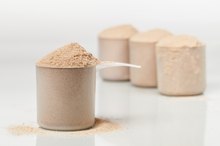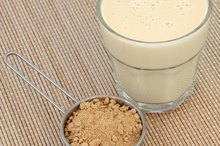Immunocal Dangers
Immunocal is a brand name for a hydrolyzed whey protein powder, also known in Canada as Humanized Milk Serum, or HMS-90 1. Whey, which you may remember as part of Little Miss Muffet’s lunch in the nursery rhyme, is the byproduct that's left after the curds are strained out when making cheese. Hydrolyzed whey protein powder is specially treated to make it more digestible and dried.
Cost and Allergies
Most of the information available about Immunocal comes from sources that are involved in marketing the product, so it is exceedingly positive, but much of it is backed up by scientific research. In general, you can consider it a safe if expensive food supplement — a box of 60 packets, totaling about two ounces of powder, retails for $72 to $90, or about $575 to $720 a pound. So the biggest danger is spending far too much for a protein powder that may do nothing more for you than drinking a quart of milk would.
Immunocal presents few, if any, dangers to most people. It is purified to eliminate more than 99 percent of the lactose (milk sugar) that is in whole whey, and casein, the main protein found in milk, isonly present in trace amounts. For some people, even the small amounts of these substances can cause an allergic reaction, which can be extremely dangerous, even life-threatening, if it’s not treated in time. It’s worth noting that this allergy is very rare.
- Most of the information available about Immunocal comes from sources that are involved in marketing the product, so it is exceedingly positive, but much of it is backed up by scientific research.
- For some people, even the small amounts of these substances can cause an allergic reaction, which can be extremely dangerous, even life-threatening, if it’s not treated in time.
Transplant and Kidney Patients
Are There Any Side Effects of Protein Powder?
Learn More
Whey powder is touted for boosting the body’s immune system. Those who are taking immunosuppressant drugs after having received an organ transplant or to treat an autoimmune disease should approach Immunocal with caution. People suffering from kidney and liver disease are often told to avoid too much protein, since those organs are involved with filtering out excess protein from your body, and concentrated protein supplements like whey powder can put stress on them. Even people with normal livers and kidneys should beware of overdoing it with protein supplements. Some of the websites selling Immunocal minimize the dangers associated with liver and kidney problems, so the best advice is to check with your doctor if you have any questions about what is safe.
- Whey powder is touted for boosting the body’s immune system.
- People suffering from kidney and liver disease are often told to avoid too much protein, since those organs are involved with filtering out excess protein from your body, and concentrated protein supplements like whey powder can put stress on them.
Drug Interactions
Whey protein can also interfere with certain drugs, including the tetracycline antibiotics. Other antibiotics that might interact with whey protein include:
- ciprofloxacin (Cipro)
- enoxacin (Penetrex)
- norfloxacin (Chibroxin
- Noroxin)
- sparfloxacin (Zagam)
- trovafloxacin (Trovan),
- grepafloxacin (Raxar)
L-dopa, which is used to treat Parkinson’s disease and other conditions, can also have negative drug interactions with whey powders.
Related Articles
References
- Fitted for Life.com: Whey Protein Dangers
- Frequently Asked Questions About Immune-Enhancing Bioactive Whey Proteins
- RX List: Whey Proteins
- Gilbert, J.-A., Bendsen, N. T., Tremblay, A., & Astrup, A. (2011). Effect of proteins from different sources on body composition. Nutrition, Metabolism and Cardiovascular Diseases, 21, B16–B31. DOI: 10.1016/j.numecd.2010.12.008.
- Hulmi, J. J., Lockwood, C. M., & Stout, J. R. (2010). Effect of protein/essential amino acids and resistance training on skeletal muscle hypertrophy: A case for whey protein. Nutrition & Metabolism, 7(1), 51. DOI: 10.1186/1743-7075-7-51.
- Ridge, A., Devine, A., Lyons-wall, P., Conlon, J., & Lo, J. (2018). The impact of whey protein supplementation in older adults on nutrient intakes and satiety over an 11-week exercise intervention. Food Quality and Preference, 68, 72–79. DOI: 10.1016/j.foodqual.2018.01.013.
- Tahavorgar, A., Vafa, M., Shidfar, F., Gohari, M., & Heydari, I. (2014). Whey protein preloads are more beneficial than soy protein preloads in regulating appetite, calorie intake, anthropometry, and body composition of overweight and obese men. Nutrition Research, 34(10), 856–861. DOI: 10.1016/j.nutres.2014.08.015.
- Thomas, D. T., Erdman, K. A., & Burke, L. M. (2016). Position of the Academy of Nutrition and Dietetics, Dietitians of Canada, and the American College of Sports Medicine: Nutrition and Athletic Performance. Journal of the Academy of Nutrition and Dietetics, 116(3), 501–528. DOI: 10.1016/j.jand.2015.12.006.
- Zhu, K., Kerr, D. A., Meng, X., Devine, A., Solah, V., Binns, C. W., & Prince, R. L. (2015). Two-Year Whey Protein Supplementation Did Not Enhance Muscle Mass and Physical Function in Well-Nourished Healthy Older Postmenopausal Women. The Journal of Nutrition, 145(11), 2520–2526. DOI: 10.3945/jn.115.218297.
Writer Bio
Manny Frishberg made his home on the West Coast for more than 30 years. He studied writing and journalism at Portland State University. His articles have appeared in Wired News.com, "Discover," the "Puget Sound Business Journal" and dozens of other websites and magazines and has earned four writing awards from the Society for Professional Journalism.









